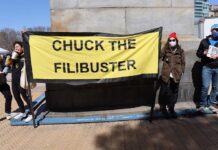
(NationalUSNews.com) — On Thursday April 25, The U.S. Supreme Court convened to hear arguments in the ongoing trial against former president Trump on charges of interference in the 2020 presidential election. As his presence is required in New York for his trial regarding alleged hush money paid to Stormy Daniels, Trump was not present. The arguments for presidential immunity for any “official acts” while in office were made by his attorney, John Sauer. Arguing for special counsel Jack Smith was former Deputy Solicitor General, Michael Dreeben.
While it has long been understood that a sitting president has immunity against lawsuits while in office, the scope of that immunity has been disputed for just as long. There are also processes in places, such as impeachment, that allow legal actions to be taken against both current and former presidents. The case against Trump contends that he is responsible for an attempted insurrection at the Capitol on January 6, 2021. While some refer to it as that way, others have called it a rally or protest. Trump’s responsibility for the actions of the crowd remains a subject of heated debate.
After arguments were made by Dreeben and Sauer, the 12 Supreme Court justices discussed various hypotheticals to test where lines could be drawn in presidential immunity. Justice Ketanji Brown Jackson theorized that without threat of criminal prosecution, a sitting president could just turn the White House into the “seat of criminal activity” in America. However, Justice Brett Kavanaugh pointed out this could mark the start of partisan prosecutors on either side of the aisle investigating all opposition presidents going forward. Justice Sonia Sotomayor even suggested presidents would use the immunity to simply assassinate rivals and call it an official act.
Sauer’s main point was that when acting in an official capacity, presidents should expect immunity until there has been an impeachment and conviction in the case. He acknowledged that when discussing criminal prosecution, that doesn’t sound good. However, he pointed out that the U.S. has a series of structural checks that have prevented such extreme hypotheticals from taking place for 234 years. Dreeben, arguing for less immunity, claims there are already “layered safeguards” to protect against malicious prosecution. Justice Neil Gorsuch commented that the court could be deciding “a rule for the ages.”
Copyright 2024, NationalUSNews.com
















